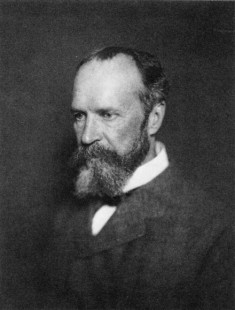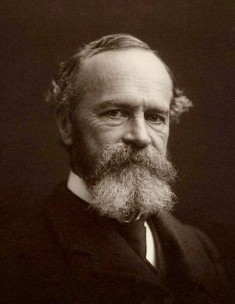William James is considered to be one of the most stimulating and insightful American philosophers, as well as second of the three great pragmatists. As the professor of philosophy and of psychology at Harvard University, William became the most popular living psychologist in American and later the most renowned living American philosopher of his time. Evading the logically tight systems of European rationalists, William cobbled together a psychology full of philosophical implications and one that is enriched by his own psychological expertise.
Early Life
William James was born to Mary Walsh and Henry James in 1842 in New York City. He came from an extremely affluent family. His father was interested in theology and philosophy and strove to offer him with a rich education. The James children made regular trips to Europe, went to the best schools, and were immersed in art, which ultimately paid off – William expressed an early interest in becoming a painter. However, his father wanted him to pursue a career in science or philosophy. Only after James persisted in his interest did his father permit him to study painting.
Higher Education Years
After studying painting with William Morris for a year, James abandoned his dream in favor of science. In 1861, he enrolled at Harvard University to study chemistry. Although two of his brothers joined the army, William did not due to his health problems. After a few years, he studied medicine at Harvard, where he continued to study on and off over a few years, between sicknesses and sabbaticals, including a bout of a major depression. In 1869, he earned a degree in medicine.
The following year, William took a short break from his education to join Louis Agassiz’s voyage to the Amazon basin. He spent the next two years in Germany and France to recuperate from health woes, including depression, back pain, and sight problems. It was during this period that he became interested in psychology.
Career Highlights
James became a staff at Harvard University in 1872 as a physiology instructor. Throughout his teaching career at the university, he also served as a professor of philosophy and a professor of psychology. He was also part of a discussion group known as The Metaphysical Club, whose members comprised Charles Pierce and Oliver Wendell Holmes. James stayed at Harvard University for more than three decades, retiring 1907.
James’ Major Works
 In 1880, William was hired to write the book on the field of psychology. It took him 10 years to write one of the early primers on psychology, The Principles of Psychology. This book influenced other insightful people like John Dewey and Bertrand Russell. His interest in philosophical issues grew more as his profession progressed.
In 1880, William was hired to write the book on the field of psychology. It took him 10 years to write one of the early primers on psychology, The Principles of Psychology. This book influenced other insightful people like John Dewey and Bertrand Russell. His interest in philosophical issues grew more as his profession progressed.
In 1902, he published a book entitled The Varieties of Religious Experience. The book is considered to be another one of his leading works. The work Pragmatism further explored his philosophical views. In 1909, he published A Plural Universe. This proved to be his final major work. The next year, he went to his family’s home in New Hampshire. He died there of heart failure in 1910.
Personal Life
James married Alice Howe Gibbens in 1878. The couple were blessed with five children—Henry, William, Herman, Mary and Alexander. James and his wife were distressed when they lost their son, Herman, due to complications from cough at a tender age.
Greatest Achievements and Legacy
William James was the originator of the first self-esteem theory and it is regularly referred to today. In conjunction with Carle Lange, he developed the James-Lange theory of emotion which argues that emotions are mental reactions. When one experiences an incident, the incident causes mental changes. These changes act as the cues for emotion. For instance, if one is in danger his body will initiate the flight or fight reaction, which raises blood pressure and heart rate. The person then becomes frightened depending on these physiological experiences.
Williams James remains a broadly read philosopher. His theories on pragmatism have greatly contributed to the field of psychology as well as philosophy. According to James’s pragmatism theories, the value of an idea largely depends on its worth in the practical world and not its absolute truth.
